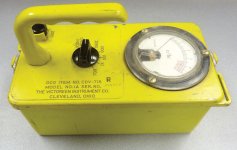Egon
Epic Contributor
The units when designed were base load on a utility grid with variable hydraulic and coal thermal plants. Today the politicians grabbed votes from the uniformed public by shutting down coal. After showing images of steam from condenser cooling towers and portraying it as smoke pollution. Or black smoke and smog form 1960's era coal plants.
The condensers were designed for intercept and relief valve operation to blow boiler steam directly into the condensers for 2-5 minutes after a turbine trip before reactor power and steam production could be ramped back. or while re-syncing the turbine after a spurious trip from lighting or grid disturbances etc.
The engineers never envisioned blowing 1200-1600Mw (gross), 300-400Mw (net) of steam for hours at a time to keep the reactors at 100% and generator output down to 400-500Mw .
Your truck is powered by a nuclear reactor ?
Designed for full load continuous operation with no provisions for extended reduced load operation. There are ways around that. Tesla had it figured out.
